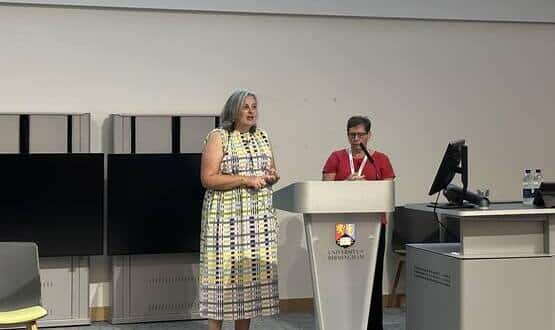Disrupting boundaries key to future of digital leadership
- 28 July 2023

Breaking out of professional silos and establishing connections across organisational boundaries will be crucial to the future of digital transformation, newly appointed National Chief Clinical Information Officer Melanie Iles and National Chief Nursing Information Officer Helen Balsdon told the Friday morning keynote session at Summer Schools 2023.
Iles, a consultant paediatrician, noted that in her 39 years in the NHS, she has been through five lots of reorganisation. She said: “What’s really clear to me is clinical engagement. We know we can’t get any transformation without clinical engagement.”
Hearing the clinical voice “loud and strong in the digital world” is also important, she added. Iles noted that over the past three months, while the NHS transformation directorate has been undergoing its current reorganisation, there has been a 30% vacancy rate that has added to the challenge of establishing a multidisciplinary team that will ensure her team is “professionally agnostic”.
Iles also emphasised the need to build ties, even “weak” ones, in order to help spread and implement innovation.
Balsdon, a specialist nurse who has held a variety of leadership roles in the health system, said her involvement with the launch of the Epic EPR in Cambridge as well as the implementation of barcode adminstration on 51 inpatient units had highlighted the challenges and benefits involved with digital change.
She recalled that after a few days with the new EPR system, nurses told her that they were leaving work on time, something they had not done in years.
“You need great oversight in terms of how to make great change and how to bring things together,” she said. She also emphasised the importance of partnerships and shared vision.
Both Iles and Balsdon stressed the significance of sharing best practice rather than wasting resources repeating work that has already been done by other organisations.
Balsdon cited the example of the number of trusts rolling out patient portfolios and looking at the issue of proxy access. She said: “We need to have big conversations so that if we do something we do it once well, all together.”
Iles concluded: “Everything about digital should be about how we can make it better for the workforce. We don’t just need hierarchy, we don’t just need networks; we need them together.”
Digital Health Summer Schools is taking place at the University of Birmingham, where CCIOs, CIOs, CNIOs and aspiring digital health leaders enjoy two days of CPD-accredited content, rewarding education, networking, and best practice exchange, and have a unique opportunity to learn from the very best digital health leaders from across the UK.




